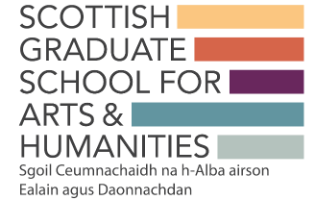SGSAH
Published: 16 September 2021
EDI and Partnerships Research Intern
Organisation
The Scottish Graduate School for Arts & Humanities (SGSAH) is the World’s first national graduate school, with 17 member HEIs from across Scotland, from the Highlands and Islands to the Scottish Borders, the oldest and the newest universities in the country, four art schools and the national Conservatoire.
Location
Hybrid. The research will be undertaken largely remoted, but with occasional meetings at the SGSAH offices in Glasgow, and potentially including travel for relevant events.
Project
SGSAH is delighted to support this three-month (full-time equivalent) internship opportunity for a doctoral researcher to undertake research focused on SGSAH’s developing EDI (equalities, diversity and inclusion) policy and practice and its implications for its partnership work.
Since its inception in 2014, SGSAH has worked in collaboration with many external organisations through partnership PhDs, research internships, artists’ residencies and our KE (Knowledge Exchange) Hubs.
This research internship position will focus on aspects of EDI in relationship to SGSAH’s partnerships, including considering the range of external partners with which SGSAH works (in Scotland, the UK and beyond, tying into SGSAH’s developing internationalisation strategy); the type and orientation of research internships and artist residencies offered; the appointment pathways for applicants to SGSAH’s partnership PhDs (e.g. the CDAs (Collaborative Doctoral Awards) and ARCS (Applied Research Collaboration Studentships)); and equitable routes into non-academic careers. The research intern’s work will build on previous internships within SGSAH focusing on partnerships, EDI and internationalisation.
The successful researcher will be supported by Helen Kendrick, SGSAH’s Partnerships Manager, and will also work closely with Claire Squires (SGSAH’s Director) and Monica Callaghan (SGSAH’s Head of Operations and Strategy). The intern will also work alongside SGSAH’s EDIC (EDI Committee) and broader stakeholders including the Doctoral Researcher Committee and the KE Hubs, in order to research, develop and deliver policy and activities which interrogate SGSAH’s current practices, and furthers SGSAH’s commitments and responsibilities in the area of equalities, diversity and inclusion with regards to partnerships in relation to arts & humanities doctoral study, within the contexts of broader AHRC/UKRI (Arts and Humanities Research Council/UK Research & Innovation), SFC (Scottish Funding Council) and individual HEI (Higher Education Institute) policies.
Recognising that potential candidates will have different strengths and interests we are keen to support flexibility of approach.
The role may particularly suit a PhD researcher undertaking a collaborative PhD, and/or someone with protected characteristics under the 2010 Equality Act, although applications from all in the arts & humanities are welcome.
Outputs
Following from the work of the 2022 SGSAH research interns in EDI, Partnerships and Internationalisation, we will support the 2023 intern to achieve the following results:
- Research and analyse aspects of SGSAH’s partnerships with regards to EDI, including: the range of external partners with which SGSAH works; the type and orientation of research internships and artist residencies offered; the appointment pathways for applicants to SGSAH’s partnership PhDs; and equitable routes into non-academic careers.
- Research potential new external partners with whom SGSAH could work (for partnership PhDs, research internships and artists’ residencies, and other partnership working)
- Drawing on the previous two points, delivery of a report analysing SGSAH’s current partnership processes and practices in relation to EDI, and recommending future actions.
- Contribution to annual review of EDI Policy and Action Plan, in the light of sectoral developments and good practice with regards to external partnerships
- Exploration of possibilities for cross-sectoral work in EDI e.g. with development of AHRC DTPs networks, including potential training events.
Timescale
Start and end date flexible.
Proposed working pattern: Flexible, although suggested working pattern of 2.5 days per week for 24 weeks. Other patterns could include:
- Single block of 12 weeks
- Multiple shorter blocks
- Longer less intensive engagement, e.g. one day per week, one week per month
Benefits to the Host
This internship aims to:
- Engage with existing and potential stakeholders and partners, particularly in relation to EDI
- Enhance SGSAH’s current offer of events and activities to suit the unique needs and requirements of partnership PhD researchers and external partners.
- Develop EDI within SGSAH’s partnership PhD programmes and research internships
- Support development and delivery of SGSAH’s EDI policy and practice
- Strengthen SGSAH’s role in socially just arts & humanities doctoral research
Benefits to SGSAH:
- Generation and implementation of EDI policy and practice.
- Fresh perspective from within SGSAH’s stakeholder community on EDI issues and challenges.
- New partnership identification & development
- Strengthening existing partnerships and relationships with students
Fit with Organisation’s Objectives:
- Aligns with key performance indicators in our SFC and AHRC funding and SGSAH 5-year plan.
- Recruits of potential future doctoral researchers in under-represented areas.
- Ensures that SGSAH’s policies and practice are in-line with and/or surpass sectoral norms
Benefits to the Researcher
Benefits include:
- Practical experience working with a dynamic team within a fast-moving and multi-faceted environment
- Professional support and mentoring
- Practical experience undertaking formative development of strategic documentation in and beyond higher education.
- Widening network of key contacts and engaging with wide range of individuals and organisations
- Understanding strengths and limitations of different evidence sources in strategic development
- Flexibility of approach.
Skills include:
- Applying self-direction and motivation
- Solution-focused approach
- Well-developed written and oral communication
- Understanding and synthesising concepts and ideas quickly
- Responsiveness to needs of partners and stakeholders
- Teamwork, skill sharing and support with a wide range of people.
Key Relationships
- SGSAH team constituting a range of academic/professional services staff
- Any other SGSAH research intern
- SGSAH blogger and digital curator
- Current stakeholders: HEI members (academic and professional services staff), external partners, doctoral researchers, applicants and alumni
- Sectoral and external experts in EDI
Subject Areas
|
Panel A |
Panel C |
||
|
X |
Select all |
X |
Select all |
|
|
History |
|
Art History |
|
|
Law & Legal Studies |
|
Library & Information Studies |
|
|
Philosophy |
|
Cultural & Museum Studies |
|
|
Theology |
|
Archaeology |
|
|
Divinity & Religions |
|
Classics |
|
Panel B |
Panel D |
||
|
X |
Select all |
X |
Select all |
|
Tick |
Design |
|
English Language |
|
|
Visual Arts |
|
Linguistics |
|
|
Architecture |
|
British Sign Language |
|
|
Creative Writing |
|
English Literature |
|
|
Film |
|
Scottish Literature |
|
|
Drama & Theatre Studies |
|
Cultural & Popular Studies |
|
|
Cultural Policy, Arts Management Creative Industries |
|
Asiatic & Oriental Studies |
|
|
Music |
|
French Studies |
|
|
Television Studies |
|
Scandinavian Studies |
|
|
|
|
Hispanic |
|
|
|
|
Portuguese & Latin Studies |
|
|
|
|
Italian Studies |
|
|
|
|
Middle Eastern & African Studies |
|
|
|
|
Russian |
|
|
|
|
Slavonic & Eastern European Studies |
|
|
|
|
German Studies (including Dutch & Yiddish) |
|
|
|
|
Interpreting & Translation |
|
|
|
|
Journalism & Publishing |
|
|
|
|
Media & Communication Studies |
Person Specification
|
E |
D |
Essential/Desirable |
E |
D |
Essential/Desirable |
|
A1 – Knowledge Base |
C1 – Professional Conduct |
||||
|
X |
|
Subject Knowledge |
|
X |
Healthy and Safety |
|
X |
|
Research methods – theoretical knowledge |
|
X |
Ethics, principles and sustainability |
|
X |
|
Research methods – Practical application |
|
X |
Legal requirements |
|
X |
|
Information Seeking |
|
X |
IPR and copyright |
|
X |
|
Information literacy and management |
X |
|
Respect and confidentiality |
|
|
X |
Languages |
|
x |
Attribution and co-authorship |
|
X |
|
Academic literacy and numeracy |
X |
|
Appropriate practice |
|
A2 – Cognitive abilities |
C2 – Research management |
||||
|
X |
|
Analysing |
|
X |
Research Strategy |
|
X |
|
Synthesising |
|
X |
Project planning and delivery |
|
X |
|
Critical thinking |
|
x |
Risk management |
|
X |
|
Evaluating |
|
|
|
|
X |
|
Problem Solving |
|
|
|
|
A3 – Creativity |
C3 – Finance, funding & resources |
||||
|
X |
|
Inquiring minds |
|
|
Income and funding generation |
|
x |
|
Intellectual insight |
|
|
Financial management |
|
|
X |
Innovation |
|
X |
Infrastructure and resources |
|
|
x |
Argument construction |
|
|
|
|
|
x |
Intellectual risk |
|
|
|
|
B1 – Personal qualities |
D1 – Working with others |
||||
|
X |
|
Enthusiasm |
X |
|
Collegiality |
|
X |
|
Perseverance |
X |
|
Team working |
|
X |
|
Integrity |
|
X |
People management |
|
|
|
Self-confidence |
|
|
Supervision |
|
X |
|
Self-reflection |
|
|
Mentoring |
|
X |
|
Responsibility |
|
X |
Influence and leadership |
|
|
|
|
X |
|
Collaboration |
|
|
|
|
X |
|
Equality and diversity |
|
B2 – Self management |
D2 – Communication & dissemination |
||||
|
X |
|
Preparation and prioritisation |
|
X |
Communication methods |
|
x |
|
Commitment to research |
|
|
Communication media |
|
X |
|
Time management |
|
|
Publication |
|
|
X |
Responsiveness to change |
|
|
|
|
|
|
Work-life balance |
|
|
|
|
B3 – Professional & career development |
D3 – Engagement and impact |
||||
|
|
|
Career management |
|
x |
Teaching |
|
|
X |
Continuing professional development |
|
x |
Public Engagement |
|
|
X |
Responsiveness to opportunities |
|
|
Enterprise |
|
|
X |
Networking |
|
X |
Policy |
|
|
x |
Reputation and esteem |
|
X |
Society and culture |
|
|
|
|
|
X |
Global citizenship |
|
|
|
|
|
|
|
First published: 16 September 2021



